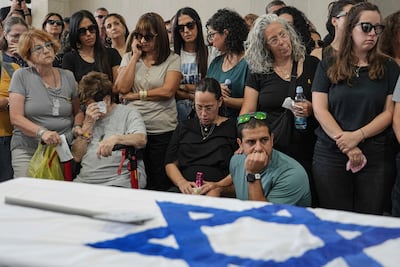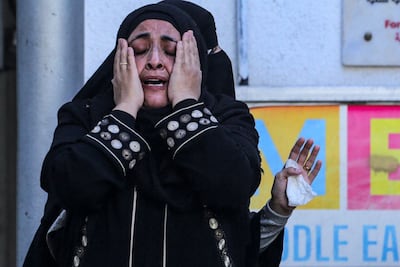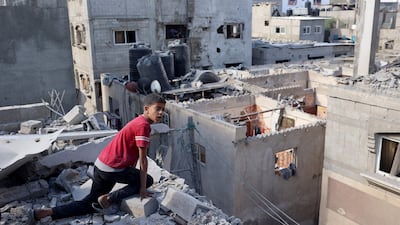Live updates: Follow the latest on Israel-Gaza
Gaza ceasefire talks are set to continue this week, with CIA director William Burns expected to travel to Israel, Egypt and Qatar before negotiators and mediators meet for a new round of negotiations.
Talks are expected to start at the beginning of next month in Cairo, sources told The National.
They said that US, Egyptian and Qatari mediators were currently finalising a new set of proposals for Hamas and Israel representatives.
The new proposals, according to the sources, reflected a “measure of flexibility” shown by Israel as its government grapples with growing isolation on the international stage and domestic pressure by families and loved ones of hostages held by Hamas since October.
On the table is a 12-month ceasefire after an initial six-week truce in which Hamas will release about 20 of the estimated 130 hostages it is holding, along with an unspecified number of bodies of Israelis killed in captivity.
The proposals will also call for a full but phased Israeli withdrawal from Gaza that’s conditional on Hamas releasing all the hostages it captured when militants attacked southern Israel on October 7.
Israel, according to the proposals, would free hundreds of Palestinians held in its prisons on security-related charges in exchange for the hostages.
The sources who spoke to The National on Sunday said Hamas would not travel to Cairo before studying the new proposals.
However, the sources warned that the latest timetable for talks and subsequent negotiations could change subject to unforeseen circumstances and that the new proposals are not guaranteed to achieve a breakthrough in the months-long negotiations.
The sources said another new proposal was for Israel to withdraw from the Gaza side of the Rafah border crossing with Egypt that its military captured on May 7.
Replacing the Israeli forces there, according to the proposals, would be officials from the occupied West Bank-based Palestinian Authority, the UN and a private security company.

The capture of the Gaza side of the Rafah crossing by Israeli forces has deeply angered Egypt, damaging relations between the two Middle East neighbours, bound by a 1979 peace treaty.
Egypt responded by shutting down the crossing, halting the flow of humanitarian aid into Gaza and intervening in support of South Africa in its case before the International Court of Justice that accuses Israel of committing genocide in Gaza.
On Sunday, Egypt’s official media reported that about 200 lorries loaded with humanitarian supplies and fuel were headed to Karam Abu Salem, where they would be delivered to the UN to distribute in Gaza after Cairo agreed on Friday to a request by US President Joe Biden to temporarily send humanitarian aid and fuel to Gaza through the Israeli border crossing.
On Saturday, Reuters quoted an unnamed official as saying a decision had been taken to resume the Gaza ceasefire negotiations later this month after the chief of Israel's Mossad intelligence agency, David Barea, met Mr Burns and the Prime Minister of Qatar Sheikh Mohammed bin Abdulrahman.
The official said it had been decided that “in the coming week negotiations will open based on new proposals led by the mediators, Egypt and Qatar and with active US involvement”.
A Hamas official later denied Israeli media reports the talks would resume in Cairo on Tuesday, telling Reuters: “There is no date”.

The US, Egyptian and Qatari mediators have been trying to broker a truce and a prisoner and hostage swap between Israel and Hamas since the collapse of a week-long truce on December 1.
The Gaza war, triggered by the Hamas October attack, has killed about 36,000 Palestinians, wounded more than twice this many and displaced the majority of the territory’s 2.3 million residents. Large parts of built-up areas, including schools, universities and hospitals, have been destroyed.
Israel’s decision to resume the negotiations comes as its government faces growing domestic and international pressure, with the families of the hostages staging street protests to demand that more must be done to secure the release of their loved ones.
The government of Prime Minister Benjamin Netanyahu is also facing growing isolation on the international stage.
Last week, the International Criminal Court prosecutor said he was seeking arrest warrants for Mr Netanyahu and his Defence Minister Yoav Gallant as well as three Hamas leaders on suspicion of committing war crimes.
Also last week, Ireland, Norway and Spain said they are recognising the state of Palestine and the International Court of Justice ordered Israel in a ruling to immediately halt its military operations in Rafah.


